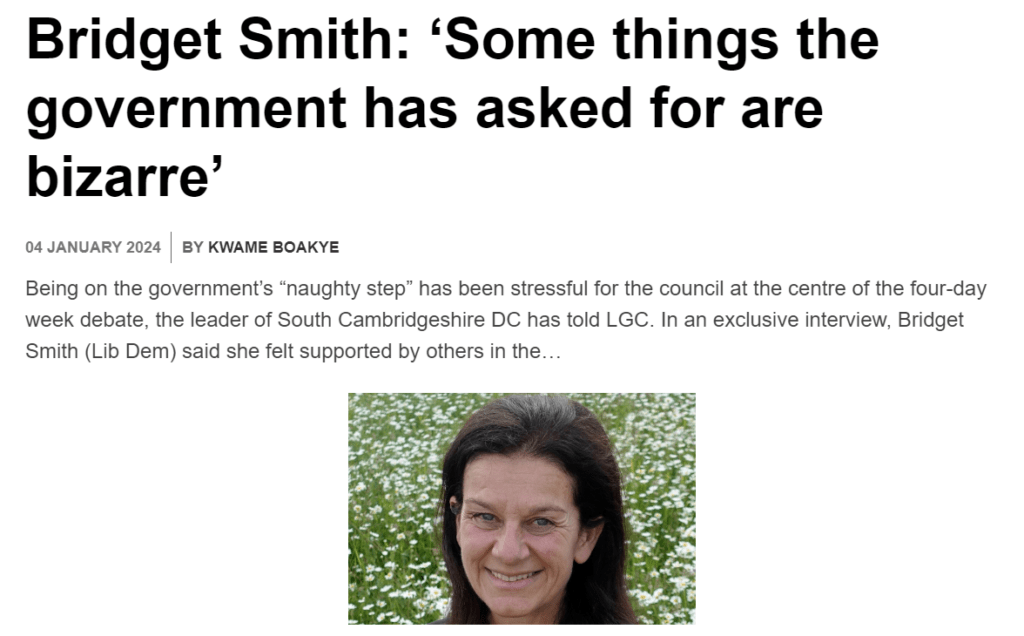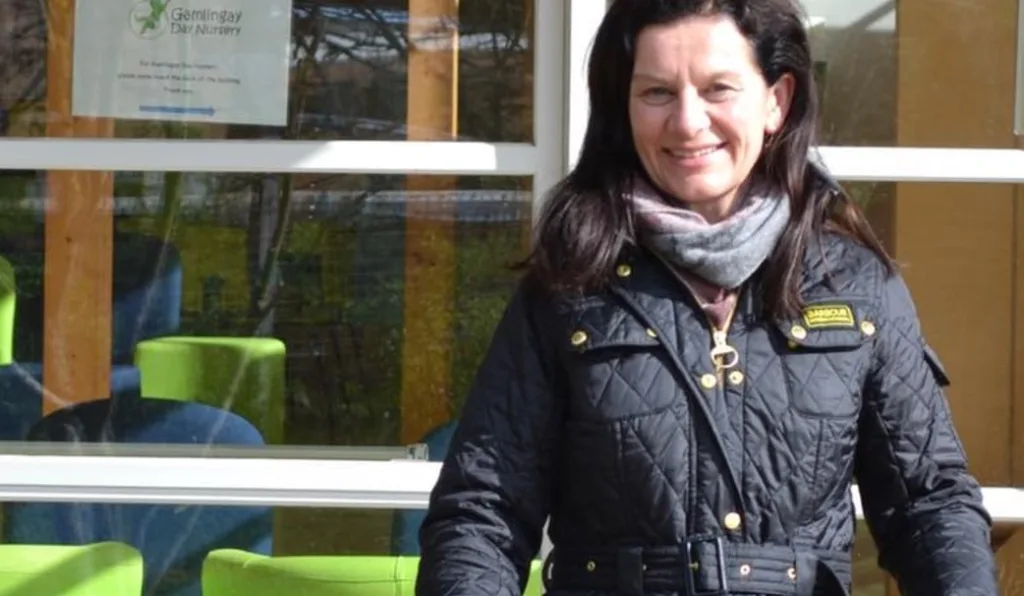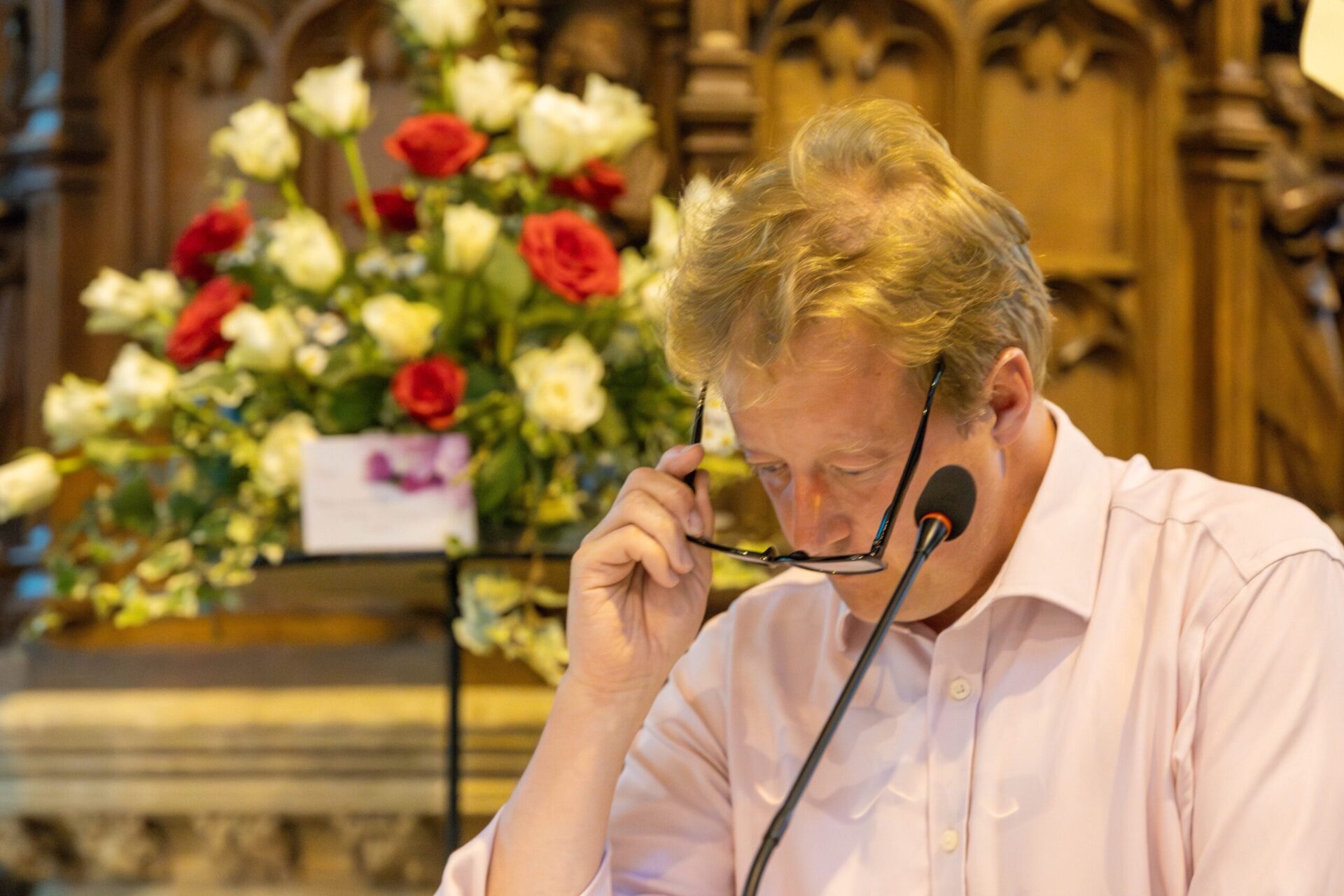The leader of South Cambridgeshire District Council Bridget Smith, having just overseen responding to 80 questions from the Government over the trial of a 4-day week, says the level of interference is “rather extraordinary”.
Her comments were given to the Local Government Chronicle (LGC) – the local government ‘bible’ – in which she says other local councils were also “appalled” by the “interference, overreach and micromanagement from central government”.
Cllr Smith told the LGC that although she knows some staff are finding the 4-day week difficult as it requires packing five days’ work into four, she also felt the trial would identify such issues and that overall, the trial was going well.
And she added that so far as bin collections were concerned, these were going “especially well”, and collection rates were amongst the highest in the country.

Cllr Smith also told the LGC that she had again written to local government minister Simon Hoare inviting him to a meeting, but this has yet to happen.
She described the council having to respond to so many questions from the Government as onerous.
Meanwhile the self-styled Taxpayers’ Alliance -which promises to “speak up for British taxpayers” – is angry at what it claims is the council’s alleged refusal to publish data or produce a business case for the 4-day week trial.
Elliot Keck, head of campaigns of the Taxpayers’ Alliance, said: “South Cambridgeshire residents are being let down by this reckless and unfair trial.
“Opaque decision-making has made it increasingly clear to taxpayers that this experiment should never have been sanctioned in the first place.
“The council must surely call time on this farce and stop the clock off once and for all.”
Last November the council convened an extraordinary council meeting to discuss a Best Value Notice issued by the Government.

The notice was issued to the council for its four-day week trial. Notices of this type were issued to three other local government bodies last year but for concerns such as an unrealistic budget, significant governance weaknesses and major cultural problems.
A three-month trial of a four-day week for desk-based staff began in January 2023 as the council tried to address critical recruitment and retention issues facing local government. These issues are particularly acute in South Cambridgeshire due to the strength of the local economy and high cost of living.
“Following independent analysis which showed performance was generally maintained, with nine areas showing substantial improvement on the previous year, that trial was extended until the end of March 2024 to assess recruitment and retention benefits over a longer term,” said a council spokesperson.
“The council has maintained its full opening hours, so they are at least the same as before the trial, and now stay open to the public later on Wednesdays.”
The Best Value Notice requested the council provides the Department of Levelling Up, Housing and Communities (DLUHC) with extensive data on a weekly basis for the next six months. This covers staffing, costs, service delivery, performance, and resident feedback.
The notice also asked for historical data on staff, costs, services, and performance dating back to 2018.
Further details about the cost of the trial, improvements outside of the trial, annual governance statements and other policies have also been requested. The council had until 8 December to provide this retrospective data.
South Cambridgeshire District Council lead Cabinet member for resources, Cllr John Williams, said: “Our staff turnover is down, our sickness is down, and our recruitment has seen clear benefits with almost 100 new staff joining the council in 2023.
“The performance of our services across the board during the trial is encouraging – and we’re collecting more than 99% of bins on-time every week.
“Thanks to an improvement in recruitment, the amount we expect to spend on agency staff cover this year is also hundreds of thousands of pounds lower than it would otherwise have been. These findings are exactly why we wanted to test a four-day week over a longer period.”
The council says that before announcing the four-day week trial, it was spending about £2 million a year on 23 agency staff who were covering vacancies – often in specialist roles where the private sector pays more.
It believes this bill could be halved if all the agency posts were filled permanently.
A three-month trial of a four-day week at Greater Cambridge Shared Waste, which South Cambridgeshire District and Cambridge City Councils share, got underway in September.
Since bins started being collected from Tuesday to Friday, more than 99% have been emptied on time.


























